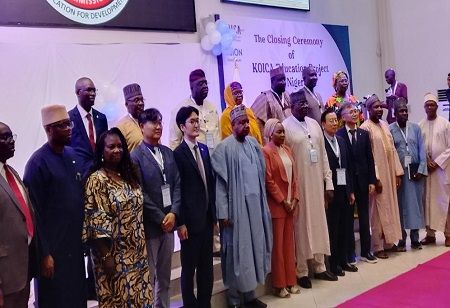- The South Korea-Nigeria Smart Education Project, led by KOICA in partnership with UBEC, has benefited over 8,000 pupils in 21 states, with wider reforms impacting millions more and transforming public school education through technology and creative pedagogy.
- Since 2021, the project has delivered milestones such as Nigeria’s first Smart Education Master Plan, six KOICA-funded model smart schools, 4,000 digital learning materials, and ICT training for 300+ teachers and administrators.
- Backed by a $10 million investment, the initiative has improved digital learning access, equipped schools with resources like 740 smart boards and 420,000 library materials, and boosted education quality for girls and special needs learners.
More than 8,000 Nigerian school children in 21 states have been assisted by the South Korea–Nigeria Smart Education Project, an initiative executed by the Korea International Cooperation Agency (KOICA) in collaboration with the Universal Basic Education Commission (UBEC). The news was delivered by UBEC's Executive Secretary, Dr. Aisha Garba, during the project's closure ceremony in Abuja.
Dr. Garba stated that while the project's center of gravity was the six specifically identified smart schools, its influence cut much deeper, reaching thousands of students and changing the face of education delivery in public schools. She articulated the work as more than mere figures, explaining that it has touched lives, remolded destinies, and consolidated the conviction that Nigerian public schools are capable of competing on the world stage. In marking the end of the project, she hailed it as a transformative experience that has reshaped primary education through technology, creative pedagogy, and participatory learning.
The project was started in 2021 when Nigeria was also beset by its learning challenges, such as more than 10.1 million out-of-school children and a prevalence of learning gaps in foundational areas. With the cooperation of KOICA and other stakeholders, UBEC attained several milestones including coming up with Nigeria's first Smart Education Master Plan, sensitizing more than 300 teachers and school administrators, setting up six world-class content production studios, and producing almost 4,000 digital learning materials in mathematics and science. This was on top of UBEC's own project to build 37 model smart schools in the nation, for which KOICA funded six.
Also Read: Kyung Hee University Establishes Global Quantum Materials Research Centre
Dr. Garba also attributed the recent reforms with eliminating long-standing barriers that had prevented states from accessing matching grants for more than two decades. Consequently, almost three million children have been reached, fund usage has surpassed 60%, and important education resources have been delivered, including more than 420,000 library resources, 158,000 books on Nigerian history, 740 interactive smart boards, and specialized technology in girls' schools and special needs learners.
Minister of Budget and Economic Planning, Senator Abubakar Bagudu, noted the $10 million investment to facilitate systematic digital education reform in Nigeria. According to him, the project framework, drawing on international best practices but tailored to Nigeria's specific environment, has enhanced the capacity of teachers in ICT and increased access to quality digital learning content. KOICA Nigeria Office Manager David Nkwa further added that the five-year effort has made considerable improvements in learning outcomes in the basic education sector.

